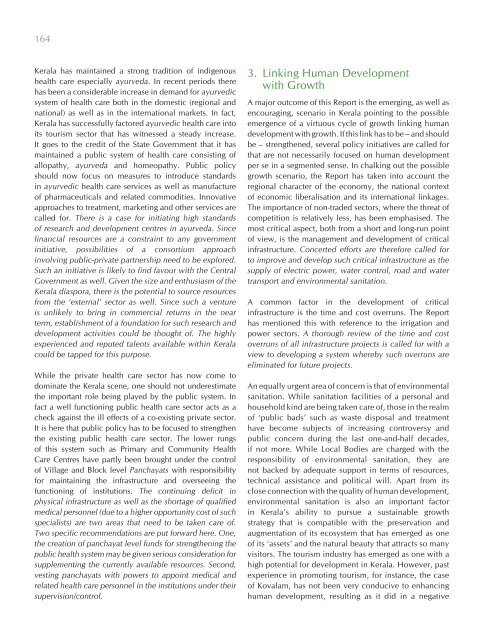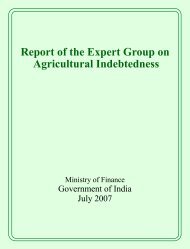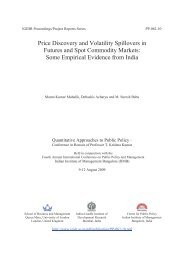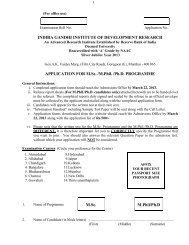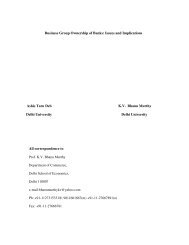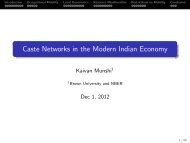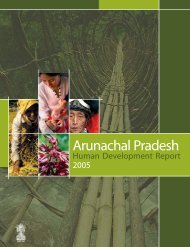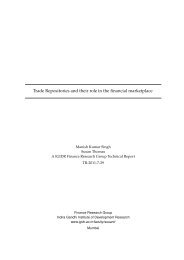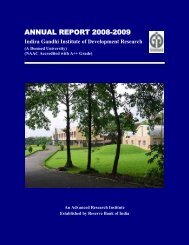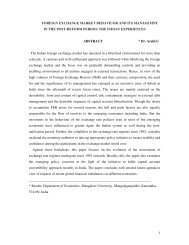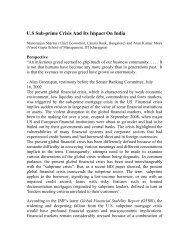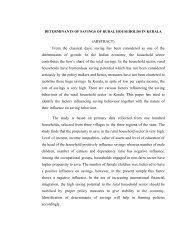Kerala 2005 - of Planning Commission
Kerala 2005 - of Planning Commission
Kerala 2005 - of Planning Commission
Create successful ePaper yourself
Turn your PDF publications into a flip-book with our unique Google optimized e-Paper software.
164<br />
<strong>Kerala</strong> has maintained a strong tradition <strong>of</strong> indigenous<br />
health care especially ayurveda. In recent periods there<br />
has been a considerable increase in demand for ayurvedic<br />
system <strong>of</strong> health care both in the domestic (regional and<br />
national) as well as in the international markets. In fact,<br />
<strong>Kerala</strong> has successfully factored ayurvedic health care into<br />
its tourism sector that has witnessed a steady increase.<br />
It goes to the credit <strong>of</strong> the State Government that it has<br />
maintained a public system <strong>of</strong> health care consisting <strong>of</strong><br />
allopathy, ayurveda and homeopathy. Public policy<br />
should now focus on measures to introduce standards<br />
in ayurvedic health care services as well as manufacture<br />
<strong>of</strong> pharmaceuticals and related commodities. Innovative<br />
approaches to treatment, marketing and other services are<br />
called for. There is a case for initiating high standards<br />
<strong>of</strong> research and development centres in ayurveda. Since<br />
financial resources are a constraint to any government<br />
initiative, possibilities <strong>of</strong> a consortium approach<br />
involving public-private partnership need to be explored.<br />
Such an initiative is likely to find favour with the Central<br />
Government as well. Given the size and enthusiasm <strong>of</strong> the<br />
<strong>Kerala</strong> diaspora, there is the potential to source resources<br />
from the ‘external’ sector as well. Since such a venture<br />
is unlikely to bring in commercial returns in the near<br />
term, establishment <strong>of</strong> a foundation for such research and<br />
development activities could be thought <strong>of</strong>. The highly<br />
experienced and reputed talents available within <strong>Kerala</strong><br />
could be tapped for this purpose.<br />
While the private health care sector has now come to<br />
dominate the <strong>Kerala</strong> scene, one should not underestimate<br />
the important role being played by the public system. In<br />
fact a well functioning public health care sector acts as a<br />
check against the ill effects <strong>of</strong> a co-existing private sector.<br />
It is here that public policy has to be focused to strengthen<br />
the existing public health care sector. The lower rungs<br />
<strong>of</strong> this system such as Primary and Community Health<br />
Care Centres have partly been brought under the control<br />
<strong>of</strong> Village and Block level Panchayats with responsibility<br />
for maintaining the infrastructure and overseeing the<br />
functioning <strong>of</strong> institutions. The continuing deficit in<br />
physical infrastructure as well as the shortage <strong>of</strong> qualified<br />
medical personnel (due to a higher opportunity cost <strong>of</strong> such<br />
specialists) are two areas that need to be taken care <strong>of</strong>.<br />
Two specific recommendations are put forward here. One,<br />
the creation <strong>of</strong> panchayat level funds for strengthening the<br />
public health system may be given serious consideration for<br />
supplementing the currently available resources. Second,<br />
vesting panchayats with powers to appoint medical and<br />
related health care personnel in the institutions under their<br />
supervision/control.<br />
3. Linking Human Development<br />
with Growth<br />
A major outcome <strong>of</strong> this Report is the emerging, as well as<br />
encouraging, scenario in <strong>Kerala</strong> pointing to the possible<br />
emergence <strong>of</strong> a virtuous cycle <strong>of</strong> growth linking human<br />
development with growth. If this link has to be – and should<br />
be – strengthened, several policy initiatives are called for<br />
that are not necessarily focused on human development<br />
per se in a segmented sense. In chalking out the possible<br />
growth scenario, the Report has taken into account the<br />
regional character <strong>of</strong> the economy, the national context<br />
<strong>of</strong> economic liberalisation and its international linkages.<br />
The importance <strong>of</strong> non-traded sectors, where the threat <strong>of</strong><br />
competition is relatively less, has been emphasised. The<br />
most critical aspect, both from a short and long-run point<br />
<strong>of</strong> view, is the management and development <strong>of</strong> critical<br />
infrastructure. Concerted efforts are therefore called for<br />
to improve and develop such critical infrastructure as the<br />
supply <strong>of</strong> electric power, water control, road and water<br />
transport and environmental sanitation.<br />
A common factor in the development <strong>of</strong> critical<br />
infrastructure is the time and cost overruns. The Report<br />
has mentioned this with reference to the irrigation and<br />
power sectors. A thorough review <strong>of</strong> the time and cost<br />
overruns <strong>of</strong> all infrastructure projects is called for with a<br />
view to developing a system whereby such overruns are<br />
eliminated for future projects.<br />
An equally urgent area <strong>of</strong> concern is that <strong>of</strong> environmental<br />
sanitation. While sanitation facilities <strong>of</strong> a personal and<br />
household kind are being taken care <strong>of</strong>, those in the realm<br />
<strong>of</strong> ‘public bads’ such as waste disposal and treatment<br />
have become subjects <strong>of</strong> increasing controversy and<br />
public concern during the last one-and-half decades,<br />
if not more. While Local Bodies are charged with the<br />
responsibility <strong>of</strong> environmental sanitation, they are<br />
not backed by adequate support in terms <strong>of</strong> resources,<br />
technical assistance and political will. Apart from its<br />
close connection with the quality <strong>of</strong> human development,<br />
environmental sanitation is also an important factor<br />
in <strong>Kerala</strong>’s ability to pursue a sustainable growth<br />
strategy that is compatible with the preservation and<br />
augmentation <strong>of</strong> its ecosystem that has emerged as one<br />
<strong>of</strong> its ‘assets’ and the natural beauty that attracts so many<br />
visitors. The tourism industry has emerged as one with a<br />
high potential for development in <strong>Kerala</strong>. However, past<br />
experience in promoting tourism, for instance, the case<br />
<strong>of</strong> Kovalam, has not been very conducive to enhancing<br />
human development, resulting as it did in a negative


